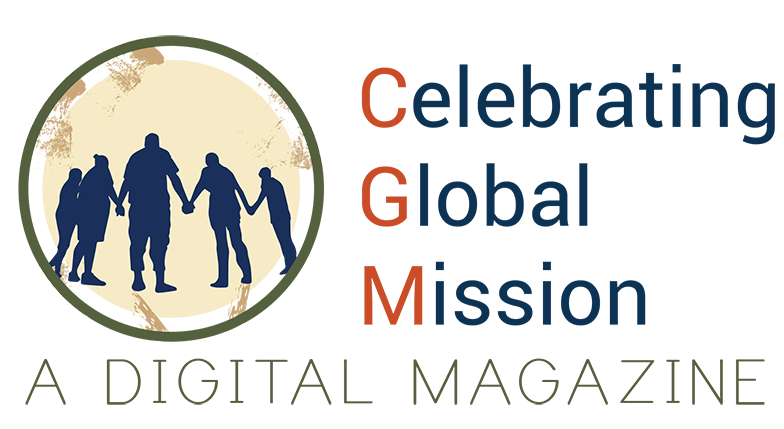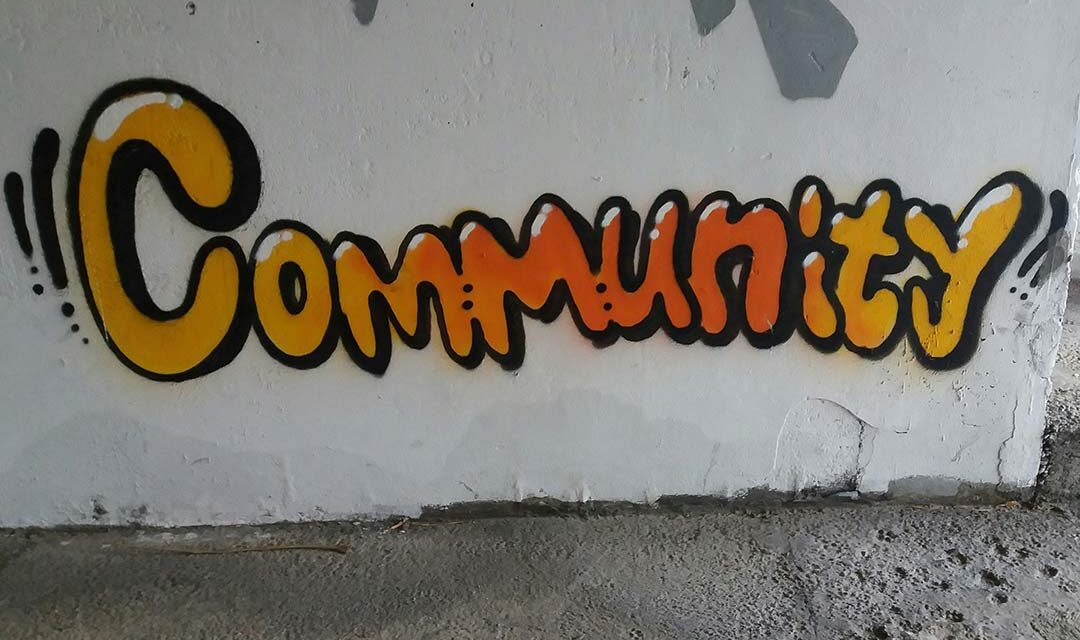Commissioned Living at the Prayer House
[These “words from the past” by Margaret Lindell, the “mother” of the WMPL Home Office, were written for a WMPL Briefing Course in 1996.]
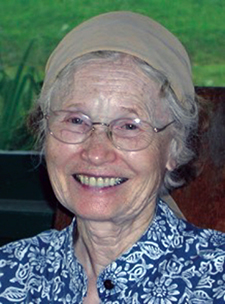
Margaret Lindell– photo published in Leaguelight, 2007
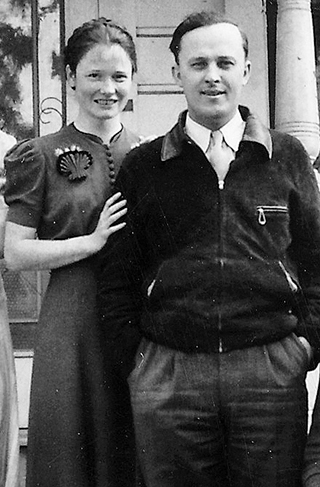
Margaret and Paul Lindell
Paul and I were married and joined the World Mission Prayer League (WMPL) in August, 1940. We had in mind to go as missionaries to the Tibetan border, but since John Carlsen and Ernest Weinhardt were in Bolivia, Paul had been asked to take charge of the headquarters at 2601 2nd Avenue South, in Minneapolis.
So we moved into the building that had been a church, a telephone exchange, and a radio mission. John Carlsen named it the Prayer House, “a house of prayer for all nations.” Two flights of steps led from the sidewalk to the upper level consisting of a large auditorium full of dusty opera seats, a space partitioned off behind the speaker’s platform, and a room on either side of the foyer, all unheated because the radiator pipes had frozen. On the street level were a chapel, a lounge, a small kitchen, two restrooms, the furnace room, and a large unfinished space in back. By the second winter the open space had been converted into four bedrooms.
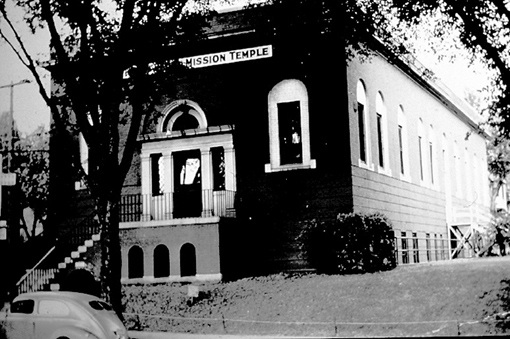
1st Prayer House
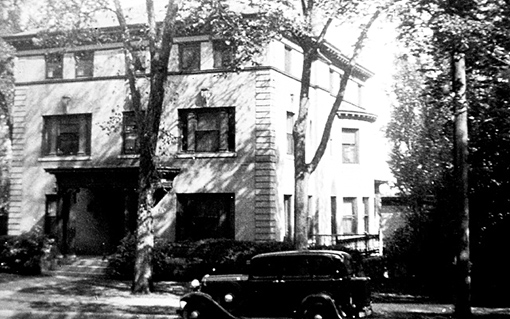
Prayer House on Clifton Avenue – early days
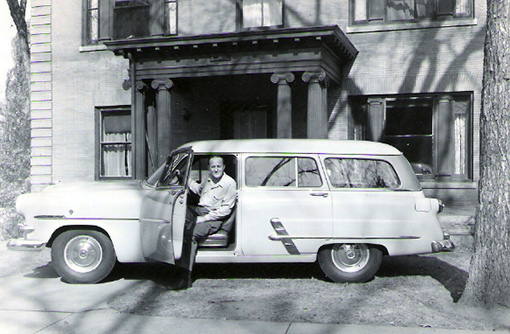
Paul Lindell in his car outside the Prayer House
When Paul and I moved in, two young women who taught Vacation Bible School in the neighborhood occupied the space behind the partition. Ted, a seminary student, and Ruby his wife, the Mission bookkeeper, lived in the lounge, so they were always the last to bed. Jonathan and Harvey had one upstairs room and Paul and I the other. We had an oil heater that worked when we had oil, and they had a washbasin with running water that worked then the pipes weren’t frozen. The Mission leaders wanted new missionaries to live at the Prayer House to learn and practice Mission principles. So prospective workers came for a shorter or longer time to seek God’s direction to prepare to leave for the field, and they sometimes slept in the chapel.
We were excited about following the Lord, about missions, and about finding our place in God’s world purpose. We met regularly for prayer, and to study the Bible, mission history, and missionary biographies. On Saturday evenings we had a public meeting which attracted many young people. Most of them were students, from the Lutheran Bible Institute, Augsburg College, and local nursing schools. Some were Augsburg choir members and with Les Brandt making the piano fairly bounce, we had some spirited singing as well as sermons on missions and personal testimonies.
A group that originated at Augsburg and called themselves the King’s Crusaders held weekly meetings at the mission headquarters with the purpose of encouraging one another in their commitment to Christ and world missions. They and those of us living at the Prayer House expressed our thinking and our vision in a concept we called “commissioned living.”
Surrender
A “commissioned” life meant a surrendered life, surrendered to Christ for the sake of the gospel. Those who moved into the Prayer House faced leaving behind their security, their plans, and often the approval of family and friends, to trust the Lord for his direction and provision. One of the posters we had around quoted C.T. Studd: “If Jesus Christ be God and died for me, no sacrifice can be too great for me to make for him.”
There were lots of struggles. Do I give up a promising career? Do I dare trust God to decide whether or whom I should marry? Do I submit to the decision of a leader or group with which I disagree? Do I have to work with someone who is slow and inefficient? (Of course, I an swift and efficient!) We encouraged each other to “die to self.” Surrendering means giving up one’s right to one’s self out of love for Jesus. He called it “losing” one’s life to “find” it. Where there is death he promises resurrection. (How can there be resurrection without death?)
Assignment
An important aspect of our life together was accepting the duties we were assigned as commissioned by God. Each of us had a responsibility: cleaning, cooking, washing, bookkeeping, speaking, and more – all that was needed to operate the household and the Mission office. No task was more important than any other because they were all from God and contributed to the same cause.
In the early days the one who washed clothes washed for everybody. On Sunday night she put the wash boiler on the kitchen stove and filled it. At 4 a.m. she turned on the burners, then at about 6 o’clock she carried the water by the bucketful to the ladies’ wash room where we had a good old Maytag wringer-washer. The clothes were rinsed in a wash tub on a stool and hung outside or in the auditorium. She usually had help, but it was her commission and it was as significant as any other.
The privilege of every Christian to have a responsibility in God’s Kingdom is clear from Scripture. Jesus told that his coming again is like a man going away and putting his servants in charge of his house, “each with his assigned task”, none knowing when the master would return (Mk. 13:34). Paul writes that he and Apollos were “only servants” to whom the Lord had “assigned each his task” (1 Cor. 3:5). And in Eph. 4, to each one of us grace has been given…for works of service so the body of Christ may be built up…as each part does its work.”
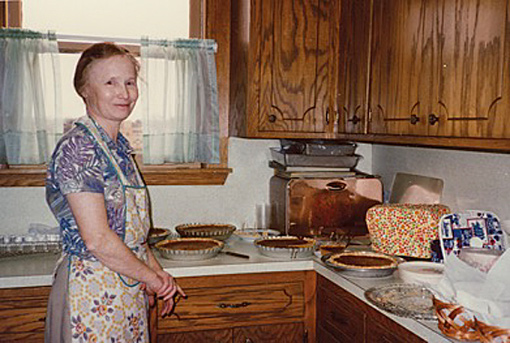
Margaret in her kitchen, photo published in 2009 Fellow Workers
What gives meaning and significance to an individual’s commission is that it is part of the Great Commission, born out of God’s love for the world. A King’s Crusaders news letter put it this way: “What God is after is not to get one or two or ten out on the mission field, but to get every believer converted to missions. It is an inner thing. Some people stay in the same job after they are converted to missions, eat and sleep in the same place, and l the same, and yet they are different. The whole issue of their life is changed because they have begun to live for the world purpose of God.”
Focus
In Nepal there are countless streams that come from the snows, rushing down the mountains and flowing over plains to the sea. They are useful along the way, but their potential is not realized till the river is dammed and water is channeled into a tunnel and dropped down a chute into turbines that generate power. Many Christians are like a river, flowing along, of service here and there, reaching the sea, but never fulfilling their potential.
Commissioned living is to focus all of one’s life into the world purposes of God. Other quotations we became familiar with were David Livingstone’s words: “I place no value on anything I possess, except in its relation to the Kingdom of God”, and what someone else said, “I ask no heaven till earth be thine.”
Though we agreed with this, it became real only as we obeyed God each day according to the light we had. Often we didn’t have coffee – either we couldn’t afford it or it wasn’t important to the cook. But one woman who lived with us a short time got withdrawal headaches, so she sneaked out twice a day to a coffee shop down the street for a fix. No one else noticed, but one day she told us that even that part of her life needed to get in line with the commitment she felt called to make, and she gave up her coffee breaks.
There’s nothing that “doesn’t matter”. My attitude toward possessions matters very much. So does how I use my money and my time. So do my relationships and how I order my life. All contribute to or detract from the effectiveness of my life in God’s world purpose.
Does this sound like law? It’s really grace; it’s love for the Lord Jesus. And it’s freedom, the freedom of the athlete stripped down to run. (And, boy, do they strip down!) “Endure hardship with us like a good soldier of Christ Jesus. No one serving as a soldier gets involved in civilian affairs, he wants to please his commanding officer” (II Tim. 2:3,4). “…let us throw off everything that hinders and the sin that so easily entangles, and let us run with perseverance the race marked out for us” (Heb. 12:1).
Provision
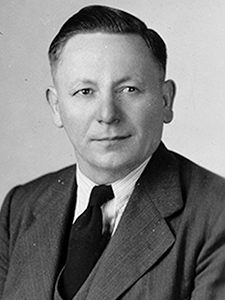
John Carlsen
When the first Prayer League missionaries, John Carlsen and Ernest Weinhardt, set out for South America, it was with the conviction that God would provide for their needs in answer to prayer without the solicitation of funds. That became the mission policy. They followed Hudson Taylor’s dictum, “God’s man in God’s place doing God’s work in God’s way will not lack God’s supply”, and they believed what Paul wrote to the Corinthians, “God is able to make all grace abound to you, so that in all things at all times, having all that you need, you will abound in every good work” (II Cor. 9:8).
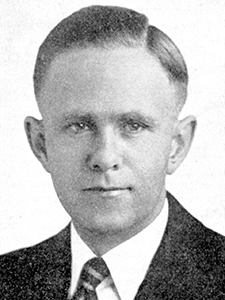
Ernest Weinhardt
Gifts designated for the Mission all went to the missionaries on the field. We used only gifts specified for the House or individuals. So among us, part of each assignment was to trust God for whatever was needed to do the job: soap for the laundry, food for the kitchen, coal for the furnace, or gas for the car. We never went hungry but we learned to be creative with what we got. It could be a bushel of carrots or five pounds of chicken gizzards. The poster over the kitchen door read: “Whatsoever is set before you eat, asking no questions.” (Would you call that creative use of Scripture?)
We sang a lot and one song we sang with gusto was by John Newton and included these stanzas:
“What though the flocks and herds were dead, / My soul a famine need not dread, / For Jesus is my living Bread.
I know not what may soon betide, / Or how my wants shall be supplied; / But Jesus knows and will provide.”
Those who were preparing to go overseas prayed for visas and travel funds. God answered then as he does now, and often we saw his answers were wiser than our requests. During World War II, young men in the fellowship who felt called to mission work, prayed to be exempted from military service. Bennert and Lenore Solberg were so sure the Lord would send them to Bolivia that even though he had been classified 1 A, they bought their tickets and prepared to leave on a Tuesday. After two appeals and denials, a judge reopened the case and on that Monday, Bennert was reclassified 4 D and Tuesday night they boarded the train for New York amid great rejoicing. But some of the men were drafted and accepted that as their commission, working at putting God’s purposes first wherever they were stationed. They, also, believed “God’s commands are his enablings.”
Fellowship
In the Prayer House and later Mission Homes there was plenty of opportunity for fellowship – regular times of prayer and study, public meetings, and three meals together every day! But we weren’t there for the fellowship. We were a community with a commission, to carry on the business of the mission, to help missionaries prepare to go, and to promote missions wherever we could. So individual commissions became subordinate to the common one.
The Old Testament prophets carried out their callings singly, but in the time of the Church, God’s people are called to be part of the Body, to work together. Each commissioned believer normally serves as part of some kind of fellowship, which may be a small group, a congregation, a missionary society, or even a family, that is focused on the command of Christ to go into all the world.
We are all like parts of a body, but I think we are also like pieces of a jigsaw puzzle: each piece is different, each piece is essential to the picture, each has to fit with those around it, and it’s not good for anything off by itself. What do you do with a puzzle piece you find under the couch? There is no “free lance” commissioned living.
Working together in any kind of community is both fulfilling and frustrating. When we put the bedrooms in the unfinished part of our building the brunt of the work fell on a resident carpenter. We salvaged materials from some houses that were being torn down, and he found himself laying the beautiful birds eye maple flooring alone while other able bodies did “nothing.” Need I say he found no joy in his work? Not until he confessed and rejected a lot of built-up resentment and criticism and let the life of the Spirit rule, did his work become a joy.
When a rock hound wants to polish his rocks he doesn’t put them in a tumbler with cotton balls but with other rocks. As the rolling goes on, more and more of the inner beauty comes to light. God, who picks up all kinds of rocks, has his tumblers too, and he delights in the loveliness that the tumbling reveals. Where is there a better place to learn servanthood, patience, humility, concern for the common good and a host of other virtues than in the company of a group of “called” individuals, all presumably serving the same cause but each with a different idea of how to do it?
We learned that there had to be submission to the leader and to the fellowship. With that and with acceptance of one another, God can work to bring fulfillment of his purposes. One later missionary couple who had a concern for the good of the fellowship were ready to leave for language school in Costa Rica when they learned of the need of a teacher for missionaries’ children in Bolivia. By mutual agreement, the wife went to Bolivia to teach and the husband went to Costa Rica to study. They were reunited soon after their first child was born. That kind of commissioned living God can use, and did.
It all comes around again to what Jesus said, “Whoever wants to save his life will lose it, but whoever loses his life for me and for the gospel will save it” (Mk. 8:35). That is “commissioned” living.
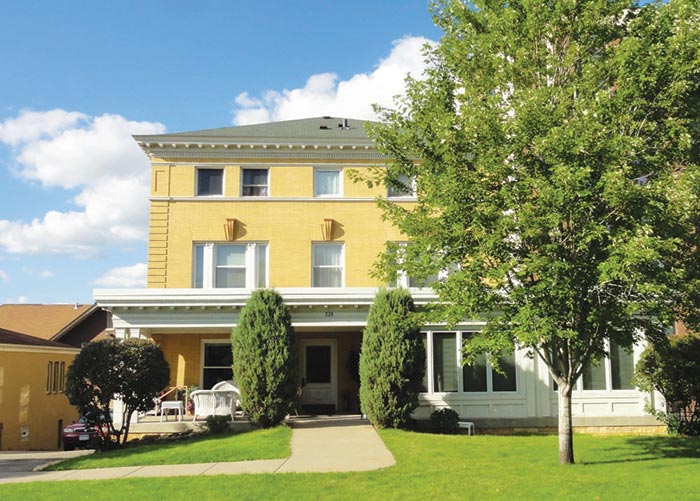
Our current Mission Home. Margaret worked as the Mission Home Hostess from 1940 – 1995. She ran up and down these stairs multiple times, even though she was in her 80’s.
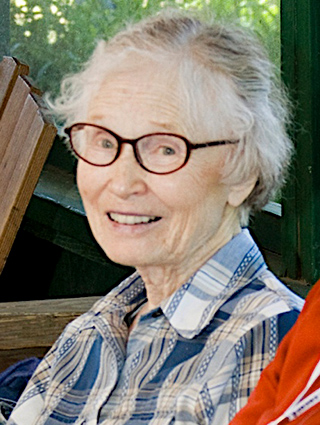
Margaret at WMPL Family Camp at Hunky Dory Farm and Resort in Wisconsin, 2010
For more information, visit the WMPL website at www.wmpl.org
email us at wmpl@wmpl.org, or call 612.871.6843
